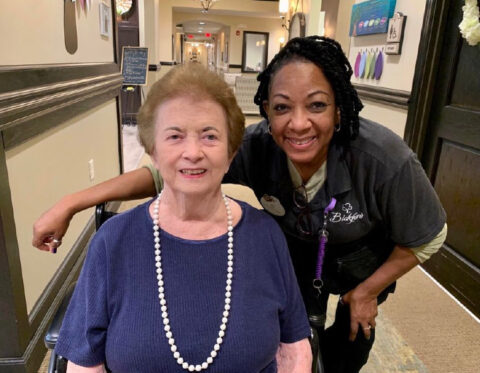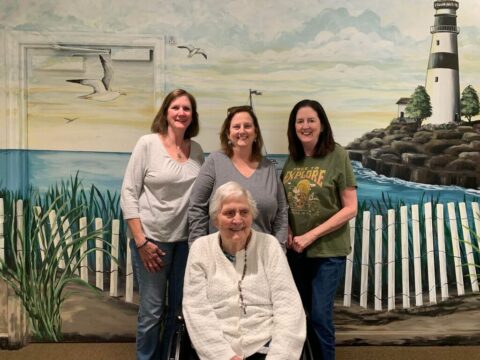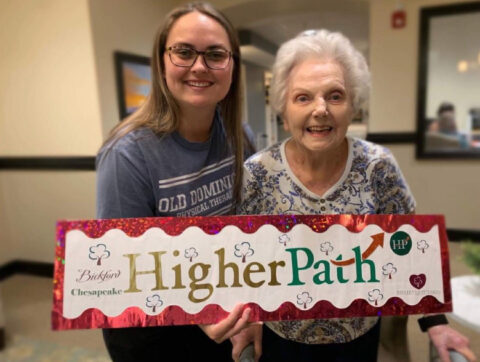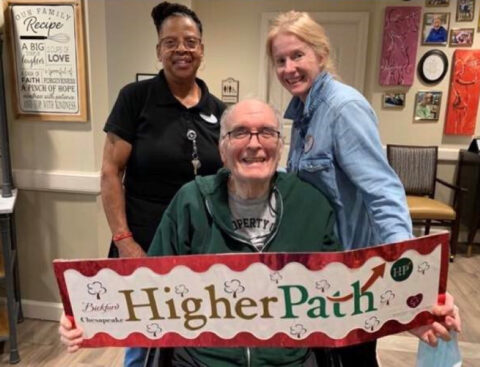More Life to Live
From the darkness of grief and health difficulties, Sue Glasco has emerged with renewed strength and purpose.
Born during the Great Depression, Sue Glasco learned about self reliance at an early age. Whether canning green beans and tomatoes from her own bountiful garden each summer, caring for her husband and two children, or becoming the Virginia state PTA president, throughout her life Sue has been accustomed to taking care of people—not the other way around.
“I’ve always been the type of person who never wants to ask for help,” says Sue, now 86.


But starting about a year ago, help is exactly what Sue needed most. She and her husband, Gene, moved into Bickford of Chesapeake together after a stroke worsened his dementia and left him unable to walk. Sue rarely left Gene’s side up until he passed away about a month after they moved in.
“It wasn’t easy,” recalls their daughter, Jenny Sue Flannagan. “They had been married for 60 years. They always said to each other, ‘I love you like a hog loves slop.’”
Following Gene’s death, Sue’s own health took a turn for the worse. She had previously been able to walk with the assistance of a rollator, but the spell of inactivity at Gene’s bedside triggered a decline that left her confined to a wheelchair. A serious urinary tract infection lead to sepsis and a hospital stay that further deteriorated her condition.
“She was on a rollercoaster of not feeling good, and also grieving her husband, and in and out of the hospital,” remembers Jessica Wright, the occupational therapist who has cared for Sue onsite at Bickford. “Usually when that happens, we want to start therapy immediately.”
At Bickford’s HigherPath meetings, Jessica and the branch leadership brainstormed how to get Sue healthy, stable and feeling consistently better. They installed a smart toilet in her room that can detect UTIs before they become problematic. Amy Scheidemantel, the branch happiness coordinator, planned activities that Sue was interested in and arranged for other residents who had lost their husbands to talk with her and offer their support. And as soon as Sue was ready, Jessica and physical therapist Ashton started almost-daily physical and occupational therapy sessions.
For a “fiercely independent” woman like Sue, one of the primary therapy goals was restoring her ability to use the bathroom without assistance. “You don’t really realize how much that impacts your daily life until you’re no longer able to do that,” Jessica says. “That’s one of the things in OT that we really attacked.”
In addition to exercises, the therapy team encouraged Sue to see a doctor about her chronic knee pain. Steroid shots made a big difference in getting Sue back on her feet.
“I think the highlight for her and all of us was the first time she took eight steps,” Jessica recalls. “That was a really big moment for her. I remember when she was too scared to stand for 10 seconds.”
With each milestone—using the bathroom, getting dressed, taking steps—Sue’s confidence grew. “I think she saw what she was able to accomplish and it motivated her to keep going,” Jessica says. “Pretty soon she was able to walk down the hallway.”


Today Sue is also in a much better place emotionally. She never misses a game of bingo, and even has a friendly rivalry with one of the other residents. A recent move into a room closer to the branch lobby enables her to scoot in her wheelchair—without help—to meals and activities, or to walk with her rollator when she’s feeling up to it.
“To me it’s a blessing because it’s just such a unique place,” Jenny Sue says. “I feel like she has a community of people here who truly adore her.”
Sue has even begun giving back to her fellow residents. On Mondays, she ventures down to Mary B’s to read scripture and sing songs with the memory care residents. Sue’s own mother had a lengthy battle with Alzheimer’s, so being able to help ease the burden for other families in the same situation has provided her a sense of purpose, Jenny Sue says. The sessions have become so popular that Sue now brings a group of six or seven other residents with her each week.
“She’s inspiring to not let obstacles get in your way of still being independent and still living your life,” Jessica says. “Even after a tragedy, after losing a loved one, there’s still life left to live after that.”
Contemplating the next chapter in your loved one’s story? Click here to learn more about Bickford Senior Living and to find a branch near you.



